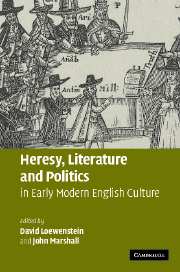Book contents
- Frontmatter
- Contents
- Acknowledgments
- Notes on contributors
- Introduction
- 1 Writing and the persecution of heretics in Henry VIII's England: The Examinations of Anne Askew
- 2 Anabaptism and anti-Anabaptism in the early English Reformation: defining Protestant heresy and orthodoxy during the reign of Edward VI
- 3 “Godlie matrons” and “loose-bodied dames”: heresy and gender in the Family of Love
- 4 Puritanism, Familism, and heresy in early Stuart England: the case of John Etherington revisited
- 5 A ticklish business: defining heresy and orthodoxy in the Puritan revolution
- 6 Thomas Edwards's Gangraena and heresiological traditions
- 7 “And if God was one of us”: Paul Best, John Biddle, and anti-Trinitarian heresy in seventeenth-century England
- 8 The road to George Hill: the heretical dynamic of Winstanley's early prose
- 9 Milton and the heretical priesthood of Christ
- 10 An Historical Narration Concerning Heresie: Thomas Hobbes, Thomas Barlow, and the Restoration debate over “heresy”
- 11 Defining and redefining heresy up to Locke's Letters Concerning Toleration
- 12 “Take heed of being too forward in imposinge on others”: orthodoxy and heresy in the Baxterian tradition
- Index
12 - “Take heed of being too forward in imposinge on others”: orthodoxy and heresy in the Baxterian tradition
Published online by Cambridge University Press: 20 February 2010
- Frontmatter
- Contents
- Acknowledgments
- Notes on contributors
- Introduction
- 1 Writing and the persecution of heretics in Henry VIII's England: The Examinations of Anne Askew
- 2 Anabaptism and anti-Anabaptism in the early English Reformation: defining Protestant heresy and orthodoxy during the reign of Edward VI
- 3 “Godlie matrons” and “loose-bodied dames”: heresy and gender in the Family of Love
- 4 Puritanism, Familism, and heresy in early Stuart England: the case of John Etherington revisited
- 5 A ticklish business: defining heresy and orthodoxy in the Puritan revolution
- 6 Thomas Edwards's Gangraena and heresiological traditions
- 7 “And if God was one of us”: Paul Best, John Biddle, and anti-Trinitarian heresy in seventeenth-century England
- 8 The road to George Hill: the heretical dynamic of Winstanley's early prose
- 9 Milton and the heretical priesthood of Christ
- 10 An Historical Narration Concerning Heresie: Thomas Hobbes, Thomas Barlow, and the Restoration debate over “heresy”
- 11 Defining and redefining heresy up to Locke's Letters Concerning Toleration
- 12 “Take heed of being too forward in imposinge on others”: orthodoxy and heresy in the Baxterian tradition
- Index
Summary
THE “OVER-ORTHODOX DOCTORS”
“No particular Words in the World are Essentials of our Religion.” This startling pronouncement was made by the Puritan divine Richard Baxter during a conference convened in London in late 1654 to define the limits of tolerable religious orthodoxy under the Protectorate. What lay behind these words was a deep-seated suspicion of credal formulae, confessions, and platforms, which to Baxter's mind simply “multiply controversies, and fill the minds of men with scruples, and ensnare their consciences, and engage men in parties against each other to the certain breach of Charity.” Since “the Christian world will never have Concord, but in a few, certain, necessary things,” to insist on subscription to any form of words is a recipe for divisiveness: “The great cause of our uncharitable censures and divisions, hath been our departing from the Antient simplicity of Faith, and also from the sufficiency of the holy Scriptures, to be the Rule and Test of Faith.” “Did the Primitive church require Subscription to all our 39 Articles?” he pointedly asked.
This distrust of credal definitions of orthodoxy was a distinctive feature of Baxter's inclusive churchmanship. Despite his inveterate disputatiousness and a temperament which could be impatient, irritable, and severe, he worked tirelessly throughout his career to counter the ecclesiastical fissiparousness of the seventeenth century. Regarding denominational labels as the product of doctrinal and ecclesiological tribalism, Baxter declined to accept any one for himself: “You could not,” he wrote, “(except a Catholick Christian) have trulier called me, than an Episcopal-Presbyterian-Independent.”
- Type
- Chapter
- Information
- Heresy, Literature and Politics in Early Modern English Culture , pp. 282 - 305Publisher: Cambridge University PressPrint publication year: 2006
- 3
- Cited by

